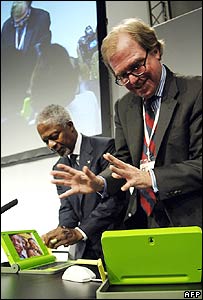Lime green machines for the least of these
During the United Nation's World Summit on the Information Society which met last week in Tunis, MIT tech guru Nicholas Negroponte unveiled his plan to bridge the technology gap between rich and poor nations. Negroponte wants to flood the world with hundreds of millions of lime-green laptops.
 The units are designed to meet the rugged demands of the two-thirds world. Able to function as a computer, a game console, and a TV, the laptops would use flash memory instead of a hard drive so there would be no moving parts. The little computers have also been designed to sip rather than gulp battery power, which can be recharged using a hand crank.
The units are designed to meet the rugged demands of the two-thirds world. Able to function as a computer, a game console, and a TV, the laptops would use flash memory instead of a hard drive so there would be no moving parts. The little computers have also been designed to sip rather than gulp battery power, which can be recharged using a hand crank.
A BBC news article on the green machines said,
It is true that there is a technology gap in today's world which is part of what keeps some two-thirds world economies from developing. It is also true that famine and disease overshadow the technology gap in many, if not most, of these countries. When you do not have enough to eat, or several of your family members are dying of AIDS, a $100 laptop may not be your highest priority, especially when your income is roughly $1 per day.
While it is easy enough to laugh off computers for the poorest of the world's poor, in his own way, the MIT professor is living in to the Gospel reading from yesterday's worship service—the parable of judgment in Matthew 25—where Jesus said,
In a communiqué issued at the end of their meeting, the Anglican Bishops of the Global South identified some weighty needs saying, Creating hundreds of millions of the lime green machines, as intriguing as that idea may be, would divert billions of dollars away from taking care of pressing concerns in order to solve more long range problems. Before taking on the technology gap through networking children's laptops, we should lift the burden of debt, curb malaria and other diseases including AIDS, and take care of necessities such as clean water—beginning with the needs Jesus spoke of in that parable saying,
Creating hundreds of millions of the lime green machines, as intriguing as that idea may be, would divert billions of dollars away from taking care of pressing concerns in order to solve more long range problems. Before taking on the technology gap through networking children's laptops, we should lift the burden of debt, curb malaria and other diseases including AIDS, and take care of necessities such as clean water—beginning with the needs Jesus spoke of in that parable saying,
peace,
Frank+
The Rev. Frank Logue, Pastor + King of Peace Episcopal Church
 The units are designed to meet the rugged demands of the two-thirds world. Able to function as a computer, a game console, and a TV, the laptops would use flash memory instead of a hard drive so there would be no moving parts. The little computers have also been designed to sip rather than gulp battery power, which can be recharged using a hand crank.
The units are designed to meet the rugged demands of the two-thirds world. Able to function as a computer, a game console, and a TV, the laptops would use flash memory instead of a hard drive so there would be no moving parts. The little computers have also been designed to sip rather than gulp battery power, which can be recharged using a hand crank. A BBC news article on the green machines said,
Although children will be able to interact with each other through the machines, education was still the priority for the laptops.Having visited non-developed and developing nations on a few continents, I wonder if Negroponte's grand scheme is not solving a problem the children do not have, while spending money that could go to crushing needs. The Green Machines promise to help network children, building stronger, better educated communities. Yet, stronger communities are something the two-thirds world has that developed nations have lost.
But by using mesh networking, the vision is for children to interact while doing homework, and even share homework tips on a local community scale.
Collaboration will also be encouraged by using open-source software, which the children could develop themselves and use in local communities.
It is true that there is a technology gap in today's world which is part of what keeps some two-thirds world economies from developing. It is also true that famine and disease overshadow the technology gap in many, if not most, of these countries. When you do not have enough to eat, or several of your family members are dying of AIDS, a $100 laptop may not be your highest priority, especially when your income is roughly $1 per day.
While it is easy enough to laugh off computers for the poorest of the world's poor, in his own way, the MIT professor is living in to the Gospel reading from yesterday's worship service—the parable of judgment in Matthew 25—where Jesus said,
I assure you, when you did it to one of the least of these my brothers and sisters, you were doing it to me!Negroponte is taking what he knows and applying it to the needs of the least in the world. And he is dreaming big as he does have every world problem in sight as he notes,
Every single problem you can think of, poverty, peace, the environment, is solved with education or including education.Yet, isn't providing the two-thirds world with what we in developed nations think they need, just another form of imperialism, or cultural colonialism? We also need to listen, discovering what those in these impoverished nations feel are their greatest needs and then work together to solve these problems.
In a communiqué issued at the end of their meeting, the Anglican Bishops of the Global South identified some weighty needs saying,
The world of the Global South is riddled with the pain of political conflict, tribal warfare and bloodshed. The moral and ethical foundations of several of our societies are being shaken. Many of our nations are beset by problems of poverty, ignorance and sickness, particularly the HIV and AIDS that threaten millions, especially in Africa.
 Creating hundreds of millions of the lime green machines, as intriguing as that idea may be, would divert billions of dollars away from taking care of pressing concerns in order to solve more long range problems. Before taking on the technology gap through networking children's laptops, we should lift the burden of debt, curb malaria and other diseases including AIDS, and take care of necessities such as clean water—beginning with the needs Jesus spoke of in that parable saying,
Creating hundreds of millions of the lime green machines, as intriguing as that idea may be, would divert billions of dollars away from taking care of pressing concerns in order to solve more long range problems. Before taking on the technology gap through networking children's laptops, we should lift the burden of debt, curb malaria and other diseases including AIDS, and take care of necessities such as clean water—beginning with the needs Jesus spoke of in that parable saying,I was hungry, and you fed me. I was thirsty, and you gave me a drink. I was a stranger, and you invited me into your home. I was naked, and you gave me clothing. I was sick, and you cared for me. I was in prison, and you visited me.Similarly, closer to home, we want to provide for others the assistance we want to give when we wish to give it. But we are called by God to help others when they need it, rather than when it is convenient. This always proves a challenge, but giving people the help they need rather than the help we want to give is just as important in Camden County as it is in the two-thirds world.
peace,
Frank+
The Rev. Frank Logue, Pastor + King of Peace Episcopal Church







0 Comments:
Post a Comment
<< Home